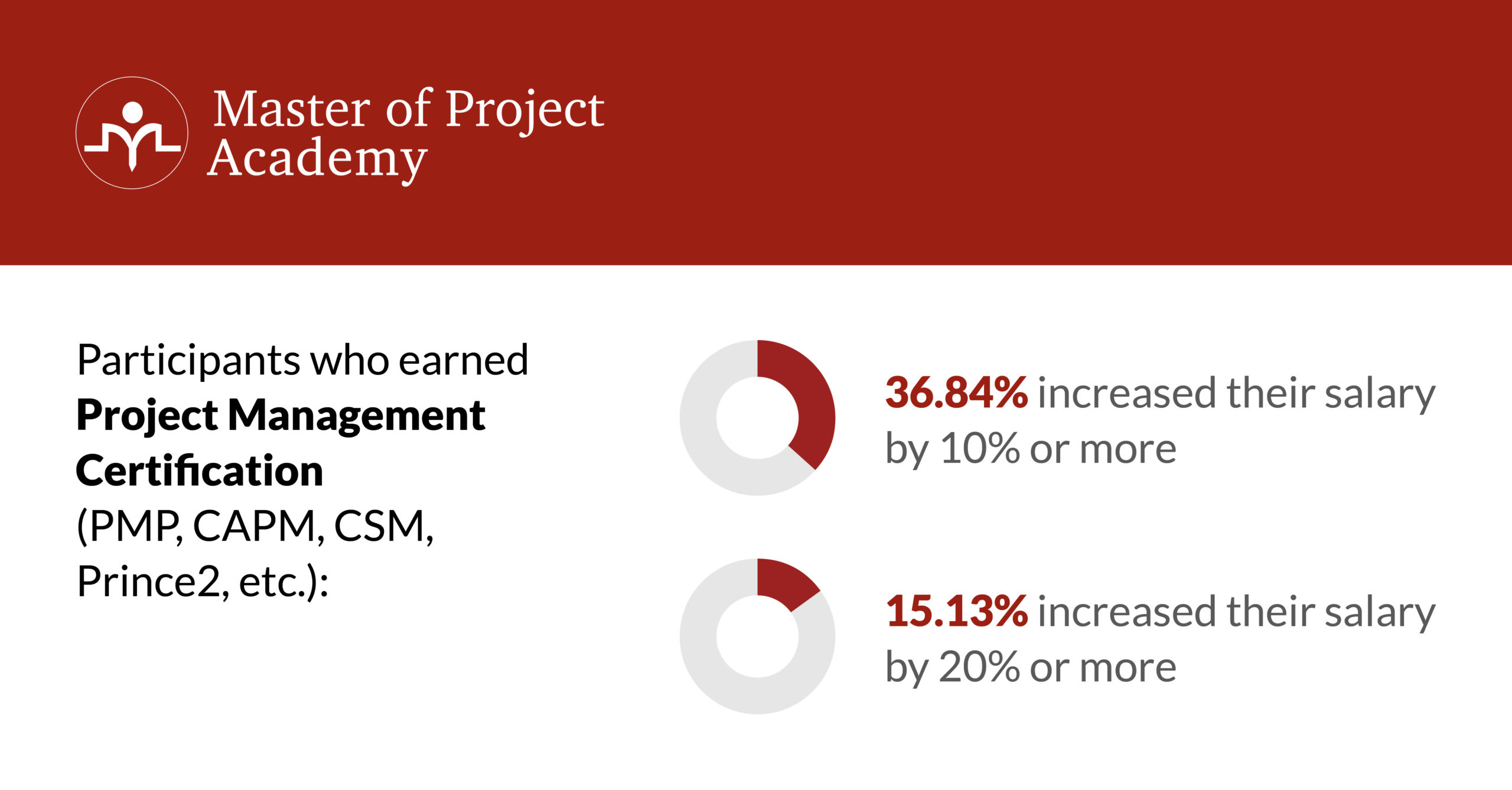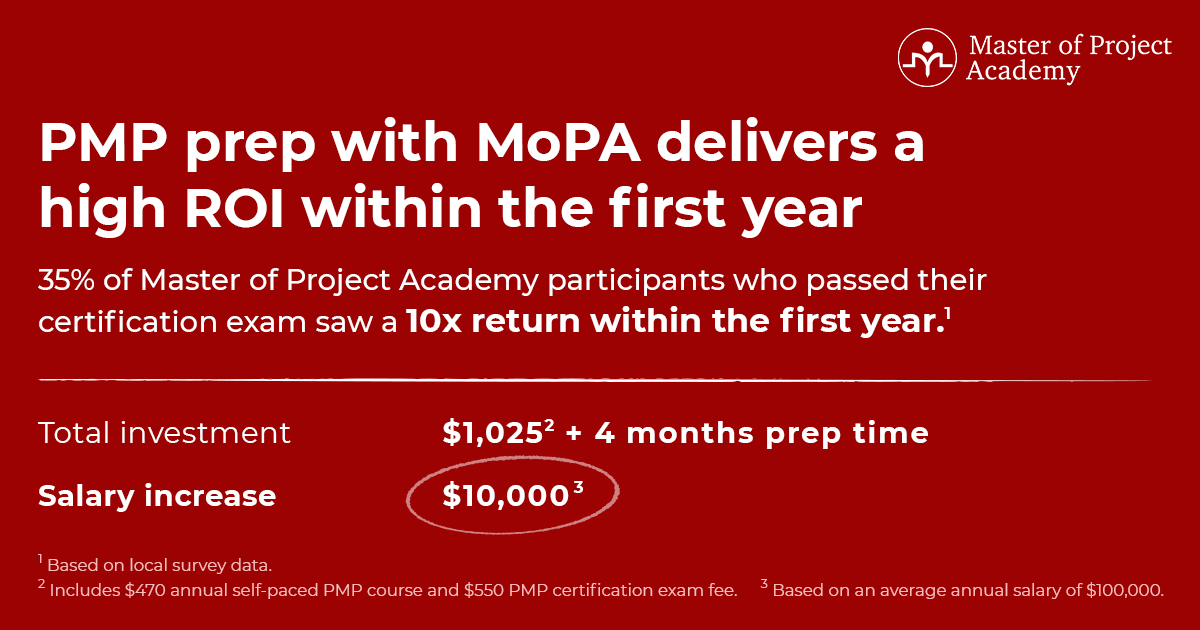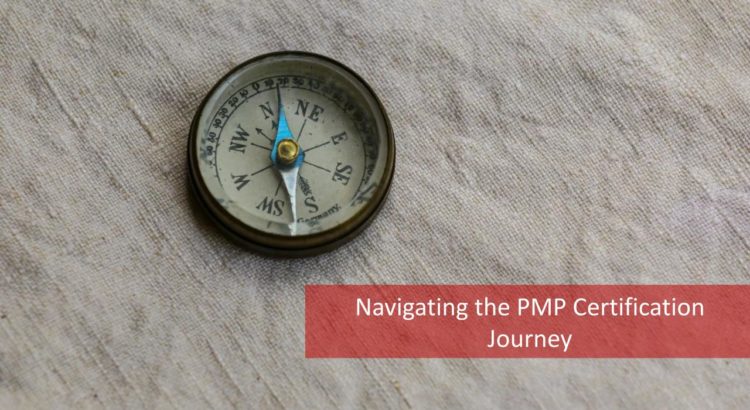Introduction
In the ever-evolving world of project management, the Project Management Professional (PMP) certification is considered a crucial milestone, representing a firm commitment to excellence and expertise. This blog is your go-to, offering a practical and all-encompassing guide designed specifically for professionals considering the PMP certification. Let’s look at the different layers of PMP certification, shedding light on not just the costs involved but also the many benefits and savvy strategies to make the entire process more accessible.
Section 1: What is PMP Certification?
Getting a PMP® certification means stepping into the global gold standard for project management. More than just a badge, it’s a worldwide acknowledgment that you possess the skills to lead projects and teams effectively. This certification, bestowed by PMI, the world’s leading professional association for a vast global community of project professionals and changemakers, serves as living proof of your ability to navigate people, processes, and business priorities in professional projects.
It’s proof of your competence in project management, showing that you can successfully lead and direct projects. Beyond just opening doors to jobs and better pay, it gives you the confidence to handle complex projects with ease.
To get PMP certified, you go through specific PMP requirements and pass a 180-question exam designed by experienced project leaders. This isn’t your average exam; it mirrors real-life project management experiences, making sure every question relates to the challenges and victories in the field.
Available in multiple languages, from Arabic to Spanish, the PMP Exam caters to a diverse global audience, making it accessible for aspiring project managers everywhere.
Section 2: Breakdown of PMP Certification Costs
When aiming for the PMP certification it is important to understand the financial expenses. Let’s break down the costs involved:
Registration Fees for the PMP Exam:
This is a crucial initial step with significant financial implications. The PMP exam fee is $405 for those with a PMI (Project Management Institute) membership and $575 for those without. While the cost may seem substantial, it is essentially a gateway to a new phase in your career.
Cost of PMP Exam Preparation Materials:
This covers expenses for books, courses, and various study resources. However, monetary investment is not the only consideration. You must also factor in the time commitment required. To be eligible for the exam, you need 36 to 60 months of project management experience, depending on whether you hold a secondary or higher degree. This substantial time commitment emphasizes the level of dedication needed to obtain this certification.
Membership Fees for PMI:
While you don’t need to be a paying PMI member to take the PMP exam, an annual membership costing $149 opens doors to valuable industry insights, free resources, webinars, and a vibrant community of like-minded individuals. Membership adds value to your overall investment.
PMP Exam Training Costs:
Investing in PMP exam training involves considerations of both cost and time. To meet the training requirements, you must accumulate 35 hours of project management education or possess CAPM certification, making you eligible for the exam. These training courses typically range from $1,000 to over $2,000, constituting a substantial upfront investment.
Additional Costs:
PMP Certification renewal fees ($60 or $150 for non-members) and potential retake add to the financial commitment. While these costs are part of the journey, they are investments in the ongoing maintenance and validation of your PMP certification.
Beyond the financial aspect, factor in the time commitment. Expect to dedicate approximately one hour for every project management education hour, totaling around 35 hours. While this might seem like a significant duration, it is a crucial element in meeting your training requirements and ensuring you feel adequately prepared for the PMP exam.
It’s crucial to note that this investment is worthwhile, bringing multiplied benefits. PMP is becoming the global standard and a prerequisite for project managers. Additionally, those with PMP certification tend to earn about 20 percent more than their non-certified peers. Therefore, the investment made now will pay off in the future, progressively increasing your earning potential.
To maximize this investment, collaborating with a reputable training provider is essential. Master of Project Academy, a trusted institution, has assisted thousands of PMP and CAPM aspirants in achieving their goals and becoming certified professionals. This collaboration ensures that your investment in PMP training is not only sound but propels you confidently towards certification success and enhanced career opportunities.
You can start your PMP journey today by enrolling in Master of Project Academy’s PMP courses:
Section 3: Factors Influencing the Cost
The costs tied to PMP certification aren’t one-size-fits-all, and understanding the influencing factors is key. Let’s look into the variables that shape the costs:
Geographical Impact:
The cost varies significantly from one country to another. For instance:
- US, Canada, Australia: $1,500-3,500
- Brazil, Chile (South America): ~$600
- China, India: ~$500
- European Countries: $1,200-2,900
- Gulf Countries (UAE, Qatar, Kuwait…): ~$2,500
Training Provider Choices:
Selecting the right training provider and study materials can influence costs. Quality training providers often offer comprehensive courses that contribute to better exam preparedness.
Mode of Training:
The choice between online and in-person training impacts costs. Online PMP certification training is a popular option. It’s advantageous for full-time working professionals as it eliminates the need to be physically present in a classroom. Online courses are more cost-effective, ranging between $700 and $1500.
Exam Retake Fees:
Understanding potential costs in case of exam retakes is essential. Currently, the retake fee is $275, and $375 for non-members. While thorough preparation minimizes this risk, knowing the financial implications is part of the overall consideration.
Considering these factors allows you to tailor your approach, ensuring cost-effectiveness without compromising the quality of your PMP certification journey. The geographical, provider, and training mode differences provide flexibility, enabling professionals to choose the path that best aligns with their circumstances and goals.
Section 4: Comparing Costs and Benefits
Making the decision to pursue PMP certification calls for a thorough evaluation, weighing the associated costs against numerous substantial benefits.
Short-term and Long-term Benefits:
Beyond the immediate career prospects, PMP certification offers enduring advantages. It not only enhances your marketability but also showcases your commitment to excellence in project management. The skills acquired through PMP preparation contribute not just to passing an exam but to your professional toolkit, proving beneficial in various projects and roles.
Return on Investment:
PMP certification is more than a credential; it’s a recognized global standard. Professionals with PMP certification often earn higher salaries, making the initial financial commitment a stepping stone to increased earning potential. According to PMI Project Management Survey, 10th edition conducted in 2023 across 37 countries, PMP-certified respondents reported earnings 23% higher, on average, than those without PMP certification. Moreover, it opens doors to a wide range of job opportunities, creating a positive impact on your career trajectory. This highlights the tangible return on investment and reinforces the value of PMP certification in enhancing both financial and professional outcomes.

Success Stories:
Deborah, a seasoned project manager, navigated projects intuitively despite lacking formal training. The discovery of PMP certification sparked change, leading her to enroll in Master of Project’s PMP boot camp. Midway through the training, a dream job in another state emerged, requiring PMP certification. Undeterred, Deborah, with the Master of Project’s support, prepared intensely for a month. The result? She not only passed the exam on her first attempt but also transformed her career and life.

PMP certification became a symbol of perseverance and limitless possibilities. Deborah’s story is a reminder that challenges are opportunities, and dreams are achievable with the right mindset and determination. The PMP certification became more than a credential; it became a symbol of her perseverance, growth, and the limitless possibilities that come with stepping out of her comfort zone. Deborah’s success story is not just about passing an exam; it’s about embracing change, seizing opportunities, and rewriting the script of her professional and personal story.
- Read our blog post to see the post–certification survey results of our past students
Section 5: Financial Assistance and Cost-saving Tips
Earning a PMP certification can pose a significant financial burden for many professionals. Recognizing this challenge, we offer direct guidance to make the pursuit of PMP certification more financially accessible. This section offers practical tips for cost reduction, ensuring that the journey to PMP certification is more inclusive and achievable for all.
Scholarships, Grants, and Employer Sponsorship:
Many organizations and institutions offer assistance to individuals demonstrating a commitment to professional development. Additionally, inquire with your employer about sponsorship programs. Some companies view PMP certification as an investment in their workforce and may provide financial backing to employees pursuing this credential.
Cost-Reduction Tips:
Maximizing cost efficiency is crucial, and there are strategic approaches to achieve this. Take advantage of early bird registration discounts offered by exam providers or training institutions. Group discounts are another avenue worth exploring, as collaborative learning can often be more economical. By joining forces with colleagues or peers, you may unlock discounted rates for training programs and resources.
Free or Low-Cost Resources:
Numerous online platforms offer PMP exam preparation resources at little to no cost. From practice exams to study guides, these resources can supplement your preparation without adding a significant financial burden. Additionally, online forums and communities can be valuable sources of advice and materials shared by those who have successfully navigated the PMP certification journey on a budget.
Access to quality project management education should not be hindered by financial barriers, and we hope that these insights will provide you with a roadmap for a more inclusive and attainable certification journey.
Section 6: Preparing for the PMP Exam on a Budget
For professionals mindful of their budget, strategic study approaches can make the journey to PMP certification not only feasible but efficient. Here are key considerations:
Efficient and Cost-effective Study Strategies:
Maximize your study efforts without breaking the bank by structuring your study time effectively. Allocate at least 6 hours per week, distributed across your workweek with flexibility to ensure consistent progress. Take diligent notes on essential concepts, formulas, and valuable insights during your PMP study. This proactive approach not only reinforces learning but also minimizes the need for additional resources.
Recommended Resources and Study Plans:
Tailor your study plan to your specific needs, learning style, and individual circumstances. Begin by understanding the exam content and then choose resources that align with your learning preferences. Develop a schedule based on PMBOK® Guide chapters, ECO Domains, tasks, and project management approaches. Consider having a study partner to keep you accountable and update your study plan as you progress. Understand what will be on the exam, know yourself, and determine the study techniques best suited for you. Practice exams with the Master of Project PMP exam simulator are invaluable to assess your readiness.
Avoiding Additional Costs:
Minimize potential extra expenses, such as exam retake fees, with strategic insights. Another way to reduce costs is by becoming a PMI member. Master of Project’s experienced instructors can guide you through the training and study process, ensuring a focused and error-free approach, ultimately saving you both time and money.
By incorporating these budget-conscious strategies, this section aims to empower PMP aspirants to prepare effectively without incurring unnecessary costs, making the path to PMP certification more accessible and achievable for individuals mindful of their financial constraints.
Conclusion
In summary, PMP certification is more than a qualification; it’s a strategic investment in your project management career. This guide emphasizes the significance of understanding costs, exploring financial assistance, and adopting cost-saving strategies. Professionals are encouraged to view PMP certification as a strategic career move, considering the long-term advantages it brings, such as a global standard, increased earning potential, and a transformative impact on professional trajectories. It’s not just an investment; it’s a pivotal step towards a more robust, resilient, and successful project management career.
Ready to elevate your project management career with PMP certification? Explore additional resources and guides to support your decision-making process and preparation. Consider enrolling in the Master of Project PMP Bootcamp or exploring our self-paced classes. Our comprehensive support will ensure you are well-equipped for success. Don’t just pursue a certification; elevate your project management career. Start your journey now!
